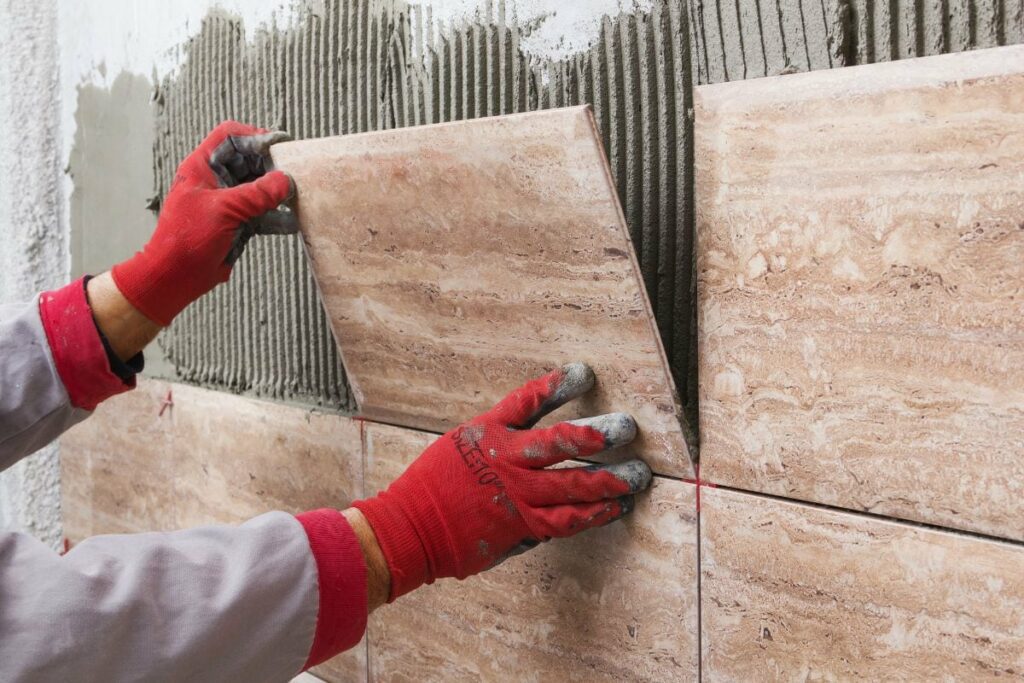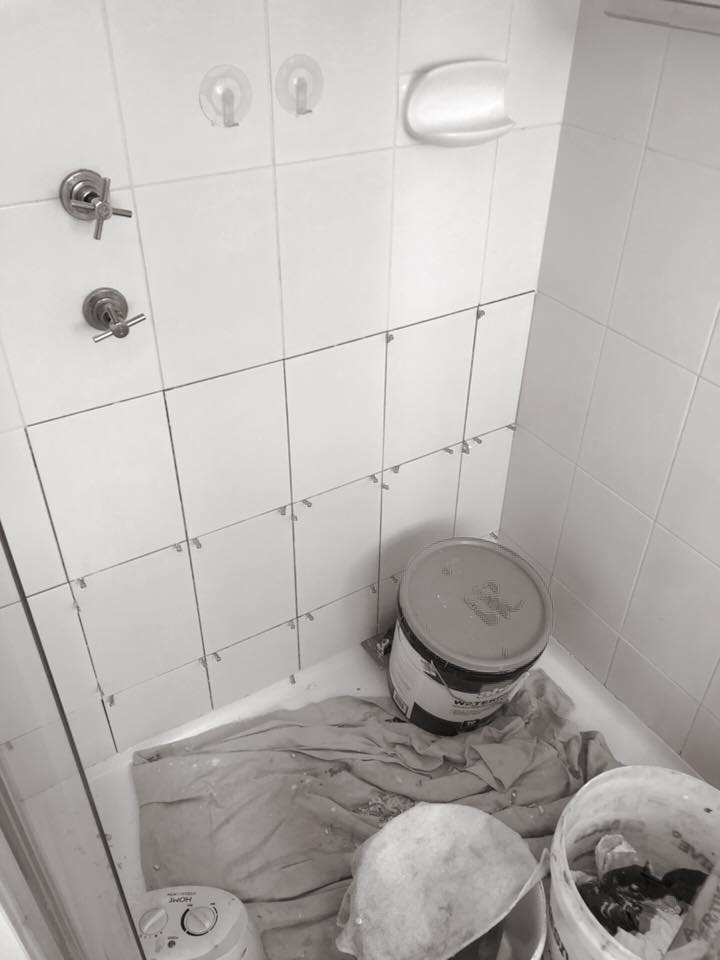While renovating your bathroom, have you ever wondered about what type of tiles you should use or where to stop them in the shower? If you are facing these problems and want to answer all your queries, you should read this blog.
It is your call if you want to extend the tile to the ceiling. But generally, people determine the height according to the shower head. Any length is okay if it protects the wall from water and damage.
Let’s explore the topic in detail and dive deep into the nitty gritty. The information below will help clear your mind with all the confusion and help renovate your shower better.
What Is the Ideal Place to Stop Shower Tiles in the Shower?

The ideal place to stop your shower tiles is when you cover 3/4 of the shower walls. This is an ideal height for tiles. But some people who don’t care about the budget extend them to the ceiling.
People extend tiles to the ceiling because it makes the shower look bigger. Tiles that go all the way to the ceiling also make the shower look more luxurious and expensive.
Deciding the perfect length for your tiled shower wall can be a confusing task. People think that there is an exact place to stop your tiles. But they are wrong.
You can stop your tiles wherever you want. You can even extend it to the ceiling and cover it as well if you are not running low on your budget. But for people who have a budget allotted for the renovation, they can cover the walls according to the shower head, which is 3/4 of the wall.
The point of putting on tiles is to protect your walls from continuous water. If that objective is covered with the length of tiles, you are good to go.
What Is the Best Type of Tile for a Shower?
People use multiple types of tiles like porcelain, ceramic, marble, limestone, etc, in their bathrooms. Among these, ceramic and porcelain work best for the shower floors and walls.
Let’s learn about different tiles made up of varying materials:
Porcelain
Porcelain tiles are made of sturdy and water-resistant material. It is also durable because it is not easy to scratch or stain such kinds of tiles. It comes in a range of designs and colors that can give an aesthetic look to your shower.
You can have glossy or matt tiles in porcelain. But these tiles are expensive. If you are looking for something worthwhile, you should go for it.
With the right care and maintenance, your tiles will last for years.
Ceramic
Ceramic tiles are made up of the same material as porcelain. The difference is that porcelain is slightly more ground than ceramic. But if you install your ceramic tiles properly and seal them accordingly, they will be a durable substitute for the former.
A plus point is that ceramic tiles can be used on the floor as well as on the walls. Also, it is cost-effective and easy to maintain. If you want to give a luxurious look to your bathroom without spending a lot of money, then ceramic tiles are what you need to get.
Marble
Marble is another material used to manufacture bathroom tiles. These are famous for giving a splendor look to your shower. It has a range of subtle colors to give a soothing vibe while showering. This material is a perfect combination of standard and modern styles and themes.
The plus point is that it doesn’t require extra maintenance, nor does you have to handle it with care. But, this comes with a slightly higher price, which can be overlooked for the style it creates in the bathroom.
Mosaic
Mosaic tiles are quite trendy in the market nowadays. This is because these tiles can be made of different materials and combinations, like porcelain, ceramic, glass, and marble.
These tiles are small in size and can be brought together to form multiple designs in the shower. It can be used on the shower floors and the walls as well. They are easy to clean and maintain. But it is an expensive tile option.
Glass
Glass tiles are one of the easiest options to customize and give a personal touch to your shower. It is available in multiple shades and tints.
An advantage of using these tiles is that the light reflection makes the room look bigger than usual and lightens up. It is water resistant and doesn’t get stained so often.
Glass tiles can be used on the floors and walls of your shower. If you want to use them on the floor, make sure to choose a slip-resistant tile.
What Is the Shelf Life of Shower Tiles?
Shower tiles last for around sixteen-eighteen years. But it totally depends on how you treat and maintain your shower. If you experience problems like leaks, growing mold, cracks, or seepages, it’s time to change your tiles.
While renovating their house, people often think about the shelf-life of the tiles they are investing in. Different materials have different warranties. But the average time is between 16-18 years, irrespective of any accidents.
But your tiles don’t always serve this period. If you are facing the following problems, you should immediately consider replacing your tiles.
Leaks and Seepages
Leakages can cause your tiles and wall to deteriorate. If it is not identified in time, it can create big damage to your bathroom.
Waterproofing your bathroom is important to avoid expensive repairs.
Cracks and Gaps
Sometimes people ignore small cracks in the tiles or walls. This ignorance causes the gaps to grow and cause a high risk of damage.
To be safe, you should have a professional check the cracks to determine if they are structural or just cosmetic.
The cracks will get bigger over time if left untreated, so you will need to get them fixed as soon as possible.
Loose Tiles
At times, the shower tiles loosen up and create problems. Like, water and moisture fill in the underneath of the tiles and cause mold and other bacteria to grow.
The main cause for tile loosening is improper installation. If the tiles are not installed correctly, they can become loose over time and cause water damage to the bathroom. If you notice any loose tiles in your bathroom, it is best to have them repaired or replaced as soon as possible.
Do You Need to Seal the Shower Tiles?

Yes, it is important to seal your tiles. If you don’t, you can cause them to loosen up in some time and deteriorate. Sealing is done to ensure that the tile doesn’t absorb moisture and water and stays intact.
Sealing is an important part performed after the tiles are cemented on the floor and walls. There are a few people who ignore the sealing part and move on. And later on, they face multiple related problems.
It is necessary to seal your tile because it makes the tile strong and clean. Tiles are porous, and water can gather beneath the tile. As a result, the tiles loosen and break. Thus always remember to seal and grout your tiles as soon as it’s installed.
Conclusion
Choosing the best height for your tiles can be a confusing and time-taking task. You might think repeatedly but still find yourself stuck in a labyrinth of your own thoughts.
But after reading this blog, you might find answers to your queries and have a great time renovating your shower.

Amos Christen graduated with a bachelor’s degree in Interior Design from Drexel University — Philadelphia, PA. Since 2003, Amos has worked with top interior design professionals in this area, including architects and interior/graphic/lighting designers. As a skilled interior designer, Amos Christen is highly versed in fine arts and crafts and uses that to supplement his main area of expertise. He often publishes articles related to home décor on several websites, including Sprucetoilets.com, Sprucebathroom.com, and Mybesuitedhome.com. He also contributes to leading interior design magazines.
